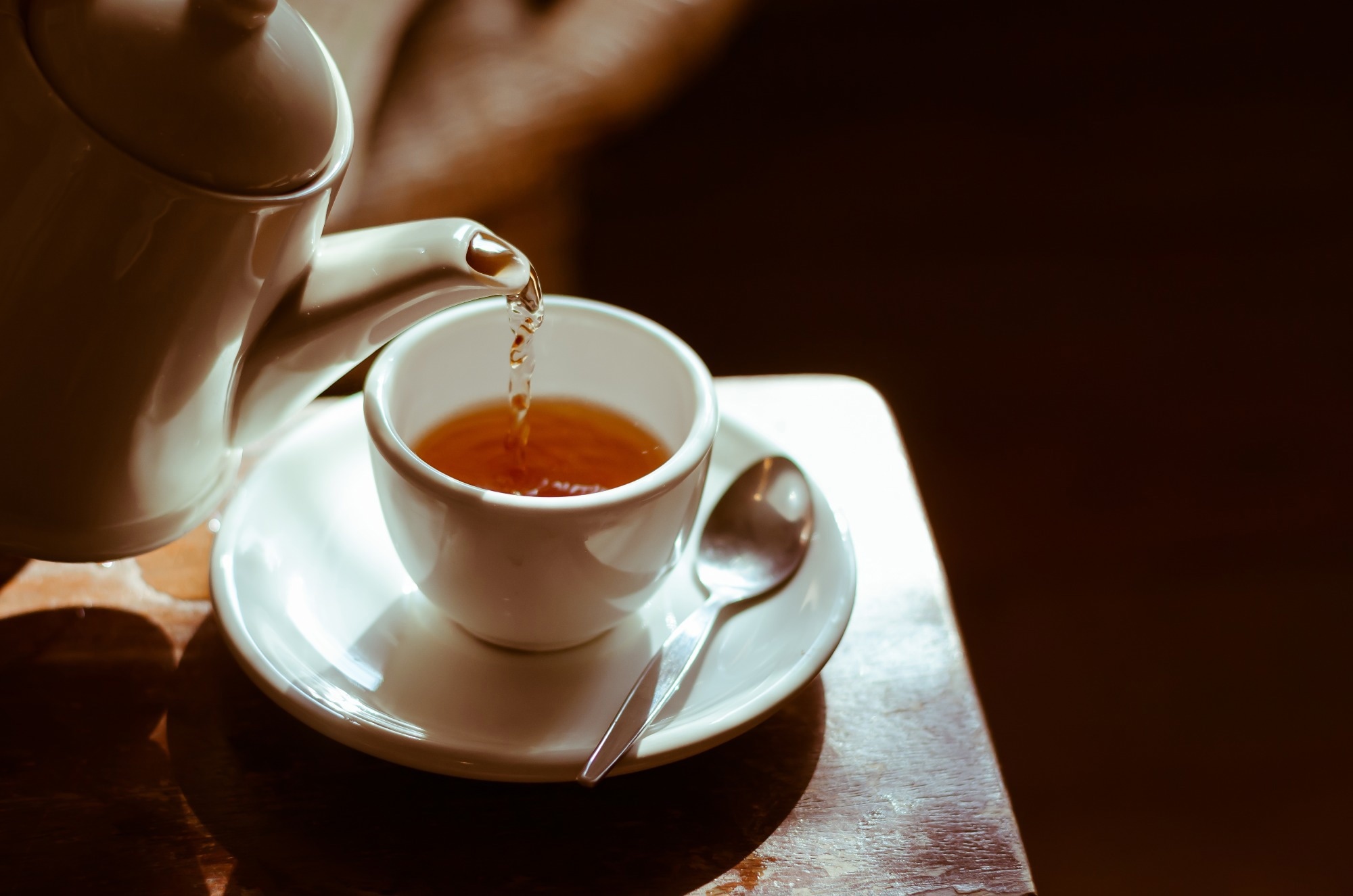[ad_1]
In a current examine printed within the Vitamin Journal, researchers investigated whether or not the protecting results of consuming tea in opposition to hypertension and mortality work together with alcohol consumption amongst Chinese language people.
 Research: Alcohol consumption masked the protecting results of tea consumption in opposition to all-cause mortality and blood stress development: Findings from CHNS cohort, 1993–2011. Picture Credit score: iroKlyngz/Shutterstock.com
Research: Alcohol consumption masked the protecting results of tea consumption in opposition to all-cause mortality and blood stress development: Findings from CHNS cohort, 1993–2011. Picture Credit score: iroKlyngz/Shutterstock.com
Background
Tea is an extensively consumed beverage throughout the globe. Lately printed research have reported the helpful results of consuming tea in opposition to varied medical circumstances, together with hypertension, cardiovascular issues, diabetes, stroke, coronary heart assault, and mortality.
Nevertheless, a number of components, akin to milk content material, smoking habits, espresso consumption, way of life, and gender, might decrease the well being advantages of consuming tea.
However, knowledge on the possible interactions of alcohol and tea regarding outcomes akin to hypertension and mortality are restricted.
Concerning the examine
Within the current large-scale, potential cohort examine, researchers investigated the affiliation between tea consumption, blood stress (BP) modifications, and demise amongst alcohol drinkers in comparison with non-alcohol drinkers in China.
The examine included 6,387 people within the China Well being and Vitamin Survey (CHNS) and was carried out within the 1993-2011 interval.
People with two or extra information of tea consumption, with a minimal of 1 from 1993, had been thought of for the current evaluation. The crew carried out group-based trajectory modeling (GBTM) to establish distinctive long-term trajectories of tea consumption over 18 years.
Information on tea consumption within the previous yr, together with imply cups of tea consumed each day, had been obtained via in-person surveys within the follow-up rounds between 1993 and 2011. People who drank alcohol within the previous yr had been thought of present alcohol shoppers. The outcomes had been demise as a consequence of any trigger and modifications in BP readings.
Within the case of mortality, relations of the deceased people had been interviewed. The final day of life or the date of the ultimate survey, whichever occurred earlier, was recorded to find out the length of follow-up.
Cox regression modeling and Kaplan-Meier statistics had been utilized to judge the cumulative mortality fee. The crew used restricted cubic splines to evaluate the non-linearity of associations between the imply consumption of tea and demise.
Generalized linear mixed-effects modeling (GLMM) was carried out to judge BP alterations amongst tea consumption trajectories, and the hazard ratio (HR) was decided by adjusting for covariates akin to age, marital standing, intercourse, nationality, residence, stage of training, occupation, annual family revenue, smoking habits, comorbidities (akin to diabetes, hypertension, and most cancers), antihypertensive remedy use, and the imply values for physique mass index (BMI), waist circumference, and hip circumference.
CHNS knowledge had been obtained from 12.0 provinces via multistage, random-cluster sampling. The CHNS cohort was initiated in 1989 and adopted up each two to 4 years from 1989 to 2015 amongst greater than 30,000 people.
Outcomes and dialogue
The typical age of the people was 54 years; 50% had been male, and 33% of them drank alcohol in present instances.
The individuals had been divided into non-tea shoppers (zero cups consumed each day), gentle tea shoppers (who drank one cup each day), and excessive tea shoppers (who drank three to 4 cups each day). Among the many examine individuals, 2,838 and 1,478 had been gentle and excessive tea shoppers, respectively.
After following up for 18 years (median), 9 p.c of individuals (n=580) died. The connection between tea consumption and mortality was influenced by alcohol consumption.
The cumulative mortality fee was decrease amongst high-tea shoppers than non-tea shoppers (HR 0.8). Nevertheless, excessive tea consumption lowered the mortality threat solely amongst non-alcohol shoppers (HR 0.6).
A linear tea-mortality relationship was noticed for present alcohol shoppers, indicating that alcohol obscured the advantages of tea in opposition to mortality. As well as, in accordance with the GLMM modeling findings, alcohol additionally obscured the BP-lowering results of tea. Comparable outcomes had been obtained within the sex-stratified analyses.
People consuming tea in excessive quantities each day had been extra prone to be older male people who smoke residing in city places.
Present alcohol shoppers had a larger chance of getting unhealthy existence and smoking and better values for BMI and waist and hip circumferences than non-alcohol drinkers, which might scale back the advantages of consuming tea.
Alcohol reportedly blunts the antioxidant exercise of tea-derived polyphenols. The BP-lowering results of consuming tea could also be as a consequence of a tea-induced delay in arterial stiffness.
Conclusions
General, the examine findings confirmed that three to 4 cups of normal tea consumption lowered the danger of demise and prevented will increase in blood stress. Nevertheless, the advantages of consuming tea had been decreased by consuming alcohol, which was, at instances, even dangerous to well being.
The examine findings underpin the helpful results of consuming tea on mortality, as reported by earlier research, and prolong the outcomes to a broader inhabitants in China.
Nevertheless, the pattern inhabitants doesn’t characterize the whole nation, and thus, the findings have restricted generalizability.
Additional analysis should analyze nationwide knowledge obtained from randomized managed trials (RCTs), on tea consumption, together with the kind of tea consumed, utilizing goal strategies.
[ad_2]
